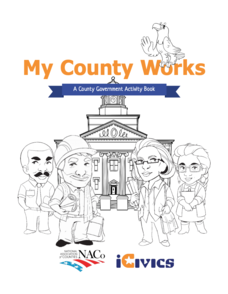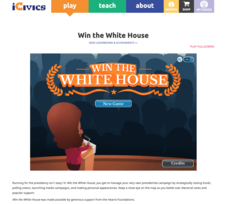iCivics
Mini-Lesson: Presidential Pardons
How do United States presidents give people second chances? Scholars research the concept of presidential forgiveness, or pardon. By completing an Executive Branch Mini-Lesson, class members get a better grasp of the power the executive...
iCivics
Mini-Lesson: Veto Power
No means no! Scholars analyze the impact of one of the president's most powerful tools—the veto—while also finding out ways to properly check facts for validity. They research the power of the presidential veto with paired activities and...
iCivics
Step One: We've Got Issues
What is the most pressing issue in your community? The resource helps you and your middle schoolers begin the process of doing something about it! Learners compare and contrast two pressing issues in their local counties by reading two...
iCivics
NewsFeed Defenders
How can people learn to spot viral deception? Players do just that with the NewsFeed Defenders media literacy game. Scholars choose avatars and the focus of their news feeds: student life, health and wellness, or sports and...
iCivics
Step Six: Real World Policies
Sometimes it takes real-world examples to get concepts to click. Use the resource to instruct middle schoolers on the relevancy of public policy in today's world. Exercises include a 5W + H graphic organizer, class discussion, and...
iCivics
Step Four: Working with Websites
Almost every profession today relates to websites in some way! The resource tasks the class to fill out three individual graphic organizers to help them analyze each website they visit.
iCivics
Step Three: Who You Gonna Call?
Problem solving is an essential skill everyone must master. The resource instructs pupils how to analyze different scenarios and decide the best way to solve many different problems that take place in communities. Scholars read, discuss,...
iCivics
Mini-Lesson: Midterm Elections
Find out the differences between presidential and midterm elections with an informative resource. Pupils discuss the importance of midterms to the presidency and how midterms affect the balance of government branches. They also fill out...
iCivics
My County Works
A 22-page packet sheds light on the hard work taking place at a county's seat. Scholars read brief informational text and fill in information about their own county workers. Pages take you to a department around the county site each...
iCivics
Win the White House
What does it take to win the White House? A video game allows young political operatives to try their hand at winning 1600 Pennsylvania Avenue by deciding on key issues, where and how to spend campaign dollars, and the role of polling...
iCivics
Responsibility Launcher
So how would pupils solve a town's problems? Using a video game, scholars tell residents of a town how to solve their problems by taking steps such as going back to school, voting, or serving in the military. As they make good choices,...
iCivics
Students Power Elections
A High schoolers Power Elections resource guide provides would-be voters with the guidance they need to become voters. Included in the packet is information about voter registration and voting, how to research candidates and ballot...
Curated OER
We Are the Government
Students read primary documents to find the motivations of the founding fathers of the United States. In this primary documents lesson, students discuss the meaning of the Preamble to the Constitution, read parts of the Constitution...
iCivics
I Civics: Games: Do I Have a Right?
Play this game from iCivics that requires an understanding and application of the Bill of Rights, the first ten amendments to the Constitution, and a few other amendments to argue and win cases the clients bring into the law firm. There...
Daily Teaching Tools
Daily Teaching Tools: Free Educational Games Online: What Is I Civics?
This Daily Teaching Tools resource explains the background of the free educational game designed by Sandra Day O'Connor, iCivics. Teachers can use this resource to assess understanding of the American government and citizenship.
Daily Teaching Tools
Daily Teaching Tools: I Civics Attributes
This Daily Teaching Tools resource explains the attributes associated with the free educational game designed by Sandra Day O'Connor, iCivics. Teachers can use this resource to assess understanding of the American government and...
iCivics
I Civics: Immigration
A WebQuest on the history and process of immigration to the United States, and the reasons and forces that influence people's decisions to immigrate. Each page has a question to answer, and a link to a site with information specific to...
iCivics
I Civics: Three Branches
A web quest looking at how a law gets passed as it moves through the three branches of the United States government: executive, legislative, and judicial. Each page has a question to answer, and a link to a site with information specific...
iCivics
I Civics: Games: Lawcraft
Interactive game that takes the student through the law-making process. Pick a member of Congress and an issue, then see what is necessary to get the bill passed and made into law.
iCivics
I Civics: Games: Branches of Power
Interactive and educational game puts players in control of all three branches of government and tests their abilities to turn issues of concern into full-fledged laws.
iCivics
I Civics: Foundations of Government
This site provides a free curriculum for studies related to the government. Lesson plans and teacher resources are provided.
iCivics
I Civics: Teachers
Standards-aligned civics resources including lesosn plans, games, DBQ activities, web-based excercises, and much more.
iCivics
I Civics: History of Ohio's Constitution
Learn about the history of the Ohio Constitution with this before and after lesson that looks at the original 1802 state constitution and the major changes made in the 1851 version. Students will explore the two documents and identify...
iCivics
I Civics: Politics and Public Policy
Use this library of mini-lessons to teach students about the electoral processes of the American political system.






















